ISIS: An Emerging Threat to the Modern World
Total Views |
April 7, 2015, Constitution Club of India, New Delhi
Chair: Shri D.C. Nath, Former Special Director, IB
Chief Speaker: Shri Tarek Fatah, Canadian Writer & Broadcaster
Speakers: Shri Maroof Raza, Senior Defense Expert, Prof. Girijesh Pant, West Asian Studies, JNU, Dr. Rajiv Nayan, Senior Fellow, IDSA, Dr. Sujata Ashwarya Cheema, West Asian Studies, Jamia Millia Islamia
On the occasion of the India Policy Foundation’s seminar on the topic “ISIS: An Emerging Threat to the Modern World”, Prof Rakesh Sinha, Honorary Director, IPF held forth on the challenges a barbaric outfit like the ISIS holds for today’s modern and pluralistic world.It is important that the role of religion in society be debated openly if we are to understand the ways of combating this growing menace to the human world.
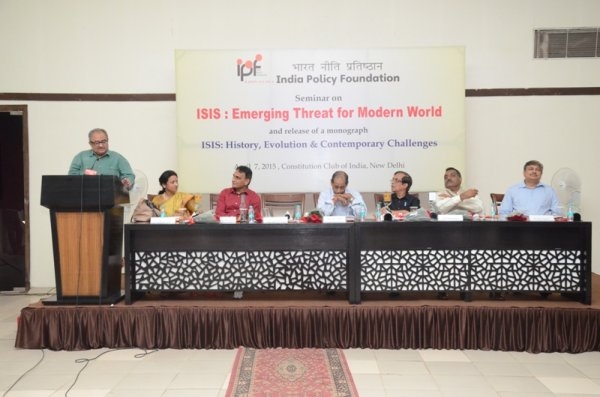
This was followed by the release of the publication ISIS: An Emerging Threat to the Modern World, published by the India Policy Foundation in both English and Hindi.
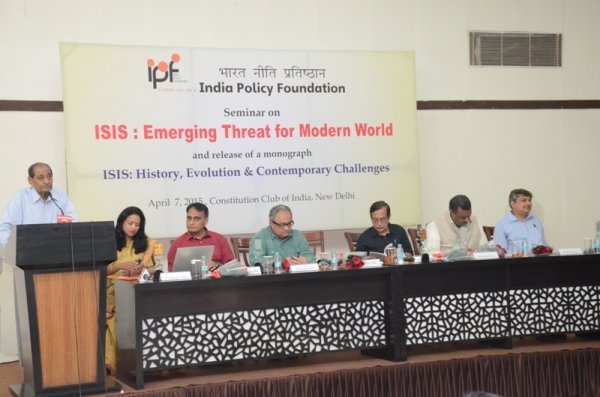
Shri D.C. Nath, former Special Director of the Intelligence Bureau chaired the session and introduced the speakers. He held forth briefly about the rise of the ISIS and its likely impact on India. Shri Nath also outlined the steps being taken by the US and its allies against the ISIS.
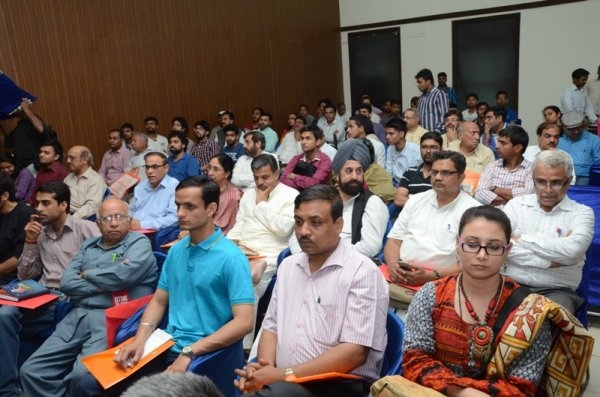
Dr. Sujata Ashwarya Cheema Professor of West Asian Studies at the Jamia Millia Islamia spoke about the ideology that animates the ISIS. She called the outfit a “millennarean group”, which believes in apocalyptic violence in bringing about forceful change in the current order, which they consider corrupt. Dabiq in Syria’s Aleppo is the supposed chosen place for this apocalyptic battle between good and evil. Dabiq is also the name of the ISIS’ propaganda magazine. Islamic armies are predicted to “triumph” over crusaders, i.e., the modern Western civilization.
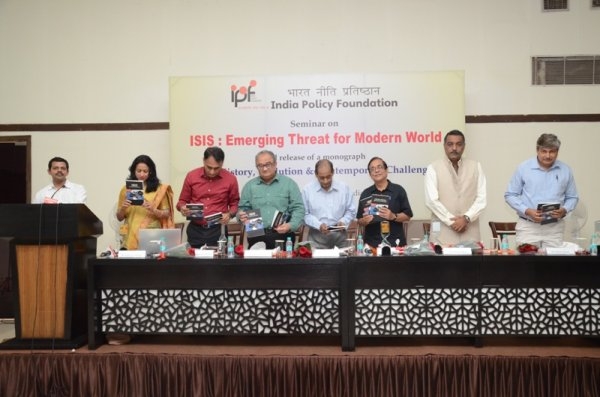
ISIS or Daesh genuinely believes in its own millennarean apocalyptic vision. ISIS also promises profanity like plunder, loot and sex. But its appeal extends beyond this, which is corroborated by the increasing number of youth joining it. Clearly, its other-worldly promise of the “triumph of Islam” over others has appealed to many Muslims around the world. It also holds that apostates and kafirs (infidels) must be put to death. This includes, Jews, Christians, Yazidis and indeed all non-Muslims.
Dr. Cheema said that the ISIS, despite its initial stunning success, has taken on much more than it can handle. US airstrikes and military action have deprived it of its bases and much of the territory it conquered has been taken away from it. She doubted its capacity to continue and forecast its disintegration. It does not have the capability to be a threat to India in any significant way, as its abilities are being severely taken down.
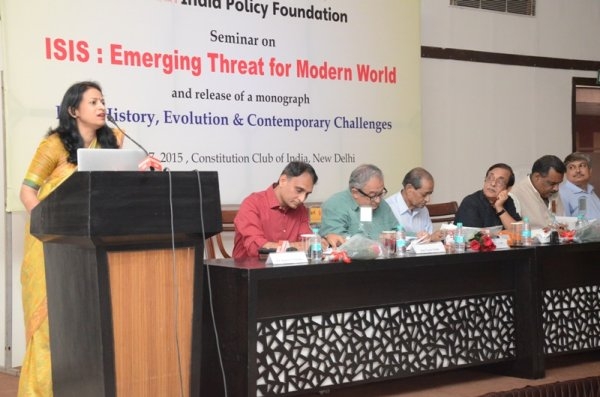
Shri Maroof Raza termed the ISIS a militant but un-Islamic organization, also complementing the IPF for bringing out the monograph. While complementing the monograph for its ability to shape opinions, he also pointed that we have to be careful in utilizing history, especially in its implications for India.
Shri Raza said that the ISIS is guilty of selectively using Islam and its teachings, distorting the message of the religion. He said that many of those who picked up the sword do not represent the religion. He called Pakistan a construct of lies and falsehood.
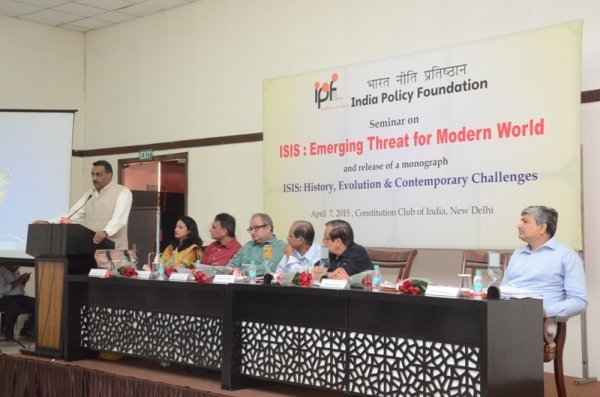
Maroof Raza blamed the Arab countries and their polities, which have supported sectarianism, something which certain politicians in India have also done, like the tragic Khalistani separatists. Raza said that the Indian model is built on transparency and pluralism. He said Muslims have moved on from the Islamic construct of 1,400 years ago. He wanted the faithful to read the Qur’an and interpret it in the light of the demands of modernity.
Raza rejected the model of the Arab world and said that it is the ISIS that represents Jahiliyat (backwards). He said that the Iraqi government of Nouri al Maliki displayed inept leadership to make the rise of the ISIS possible, but now their luck is running out. He said India’s intelligence agencies are capable of detecting threats and need to be given more credit. He said that ISIS cannot connect with Indian Muslims in any significant way, and called the ISIS a ragtag army. An army officer himself, Raza said anyone who tries to take on the Indian army would end up with a bloody nose. He called Indian Islam very different from the harsh Wahhabi Islam of the Arab world. Maroof Raza also wanted the government to curtail preaching activity by foreign Muslim clerics.
Dr. Rajiv Nayan said the ISIS is generating heat in the current world, and cited many perceptions to explain why the Islamic faith was being viewed the way it was.
Dr. Nayan voiced his apprehension about the ISIS obtaining access to weapons of mass destruction, since the terrorist outfit’s leaders has openly voiced its desire to do so. The slain Al Qaeda head Osama bin Laden and his success Ayman Zawahiri also spoke of their desire in this regard. However, documents seized from various parts of the world reveals that the ISIS is interested more in loot, plunder and profit. After the 9/11 and other terrorist incidents around the world, this threat is being taken seriously by the rest of the world. Intelligence agencies of the West are closely monitoring the movements of loose radioactive material to track its destinations. The worry of weapons of mass destruction reaching the hands of outfits like ISIS is real, Dr. Nayan said. He also pointed out that countries like Turkey were secretly supporting the ISIS, calling for India to step up its vigil against the outfit’s activities and plans.
Dr. Girijesh Pant called for a rational and sober analysis of the likely threat the ISIS poses, explaining that it is knee-jerk actions like the US invasion of Iraq over the fictitious issue of Iraq possessing weapons of mass destruction that led to the emergence of an outfit like the ISIS, which he said was the result of certain socioeconomic and political processes.
Dr. Pant called for questioning the ISIS’ claim that it represents Islam. The US invasion of Iraq in 2003 and its overthrow of Saddam Hussein created a power vacuum which has been filled by many undesirable elements, among which the ISIS is a prominent one. The successor Iraqi regime’s moves to marginalize the country’s Sunni population has also contributed a lot to Iraq’s sectarian strife, which has created conditions for the birth and spread of radical outfits like the ISIS.
The US is also reassessing its own West Asian policies, as its energy security needs have moved away from the region. The post-Arab Spring events have also necessitated such a reassessment. Saudi Arabia and Egypt are no longer the most favoured US allies, said Dr. Pant. Saudi encouragement of Wahhabi Islam has also caused disquiet. It is for this reason that the US is courting Iran as a balancing element. The recently concluded nuclear agreement with Iran is reflective of this rearranging of the West Asian order. The worrying trend, according to Dr. Pant, is that groups like the ISIS have come to acquire some kind of legitimacy. A discredited America in the Middle East is not capable of bringing about the required change.
Dr. Pant said that the strife in the West Asian region could last for five to seven years. He called for a reassessment of India’s policies of exporting manpower to the countries of West Asia. Indian expatriates to the region are also influenced by the thinking in those regions, which in course of time could be a knotty issue. India has huge political capital in West Asia and can play a significant role in deescalating geopolitical tensions between Iran and Saudi Arabia.
Shri Tarek Fatah stressed his Indian origins at the outset. He conceded that speaking on Islam was a difficult subject, as there is a Muslim patriot in every Muslim. Speaking the truth, said Fatah, was a task fraught with danger.
Tarek Fatah bluntly said that the time for political correctness has passed, because world is at war, Muslims, especially have been at war ever since the Prophet passed away. There was an internecine war of succession immediately after his death. The Prophet’s own biography runs into 1,600 pages, which most Muslims have not read at all, nor have they read the volumes of the Sharia. Tarek Fatah said that it is the ignorance of the harshness of the Sharia that has allowed most Muslims to be better human beings.
Tarek Fatah said it is tragic that Muslims celebrate those who invaded India. He said he had no issue in any follower of any religion believing any fantasy, but public law and civic life cannot be built around this. He said that Muslims in India were the offspring of those who agitated and carved out a separate state of Pakistan, and we have to stop being apologetic about it. ISIS is just a more refined and modern-day version of the ideology and thought that created Pakistan. It is this ideology that drove Hindus, Sikhs and other non-Muslims from Pakistan in 1947.
Tarek Fatah blamed earlier generations of Indians for having accepting and recognizing an evil state like Pakistan and warned that India would have to bear its consequences. He warned Indians not to ridicule ISIS and its ideologues. ISIS speaks and propagates precisely the law of the Sharia, which Pakistanis harbour in their innermost hearts.
Pakistan, said Tarek Fatah was developing tactical nuclear weapons to target Indian forces. These are weapons which not even the Soviet Union contemplated at the height of the Cold War. Pakistan is willing to suffer millions of casualties in the pursuit of its hatred towards India.
Tarek Fatah was equally forthright in exposing the inherently racist nature of the Arab mindset, in which non-Arabs are basically looked upon as inferior. He called the current Islamic mindset a death-cult, in which life on earth is considered a transit, with an imaginary paradise being the ultimate destination. Pakistanis are increasingly becoming followers of this death cult whereas Indians are busy with making money, personal advancement and entertainment, and are blissfully unaware of developments in world politics and emerging trends.
Tarek Fatah also briefly outlined the history of Islam, especially its various Caliphates and asked the audience to accept the fact that Islam’s adherents have always had a violent history. He said that India is the only country capable of fighting and destroying the ISIS, but wanted India and Indians to completely change its mindset. He said a god beginning would be to change the name of one of its streets in the Capital Delhi from that of the Mughal tyrant Aurangzeb to the benign Dara Shikoh.
Tarek Fatah concluded his gripping presentation by making concrete suggestions, chief among which was to completely cut off all links with Pakistan, as that terrorist country has nothing to offer to India. Indian peace overtures to Pakistan are nothing but meek behaviour born of an inferiority complex. Pakistan, said Tarek Fatah was nothing but a conglomerate of Punjabis and the military. He called upon Indian Muslims to sincerely support the liberation of Balochistan, which has been invaded and brutally occupied by the Punjabi-dominated Pakistani army. India had missed out an opportunity to do so in the past. India, he said, would sooner or later have to call Pakistan’s bluff on Kashmir. Sadly, most ‘intellectuals’ in India were no more than people with a clerical mindset repeating old and worn-out shibboleths. India said, Tarek Fatah, is at the epicenter of this titanic struggle for human civilization and cannot afford to lose. He also refuted the conventional wisdom that Pakistan’s nukes were safe from terrorist hands, as the officers of the Pakistani army in charge of those weapons are already soaked in the ISIS Islamic jihadi ideology.